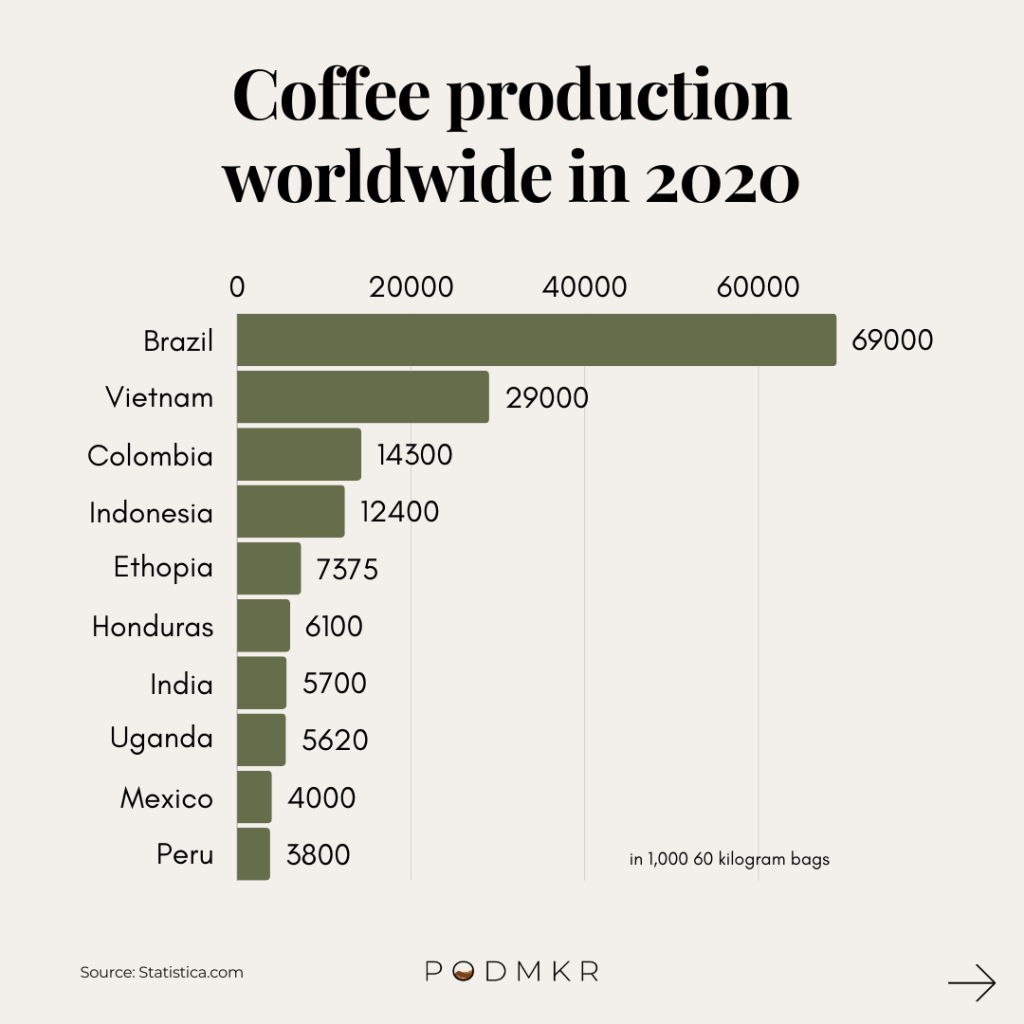Coffee is not just a beverage; it’s a global commodity that shapes economies and lives. This article explores the intricacies of the coffee business, from who produces and distributes the most coffee to the costs involved and the countries that are the biggest consumers. We’ll also look at the entire value chain and understand who profits the most from this ubiquitous drink.
Coffee Production: The Global Leaders

- Top Producers: Brazil leads the world in coffee production, followed by countries like Vietnam, Colombia, and Ethiopia. Brazil is renowned for its vast Arabica farms, while Vietnam is the largest producer of Robusta beans.
- Production Costs: The cost of coffee production varies significantly across countries. Factors influencing costs include labor, land, climate, and the type of coffee produced. Latin American countries often have higher production costs due to labor rates and the predominance of Arabica cultivation, which requires more care than Robusta.
Distribution and Export: The Major Players
- Leading Exporters: Brazil and Vietnam are not just top producers but also major exporters of coffee. Countries like Colombia, Indonesia, and Ethiopia follow them.
- The Role of Exporters: Exporters play a crucial role in the coffee supply chain, dealing with logistics, quality control, and meeting international standards and certifications.
Coffee Consumption: Who Drinks the Most?
- Top Consumers: The United States leads in coffee consumption, followed by European countries like Germany and Italy. However, per capita, countries like Finland and Norway consume more coffee.
- Changing Trends: Coffee consumption patterns are evolving, with specialty coffee gaining popularity, particularly in developed nations.
The Coffee Value Chain: From Farm to Cup
- Farmers and Growers: Farmers are the backbone of the coffee industry but often receive the smallest share of profits. Challenges include price volatility and climate change.
- Middlemen and Traders: After farmers, coffee goes through a network of middlemen and traders. While they add value by connecting producers with global markets, they also capture a significant portion of the profits.
- Roasters and Retailers: Roasters add value through their unique roasting processes, flavor profiles, and blends. Retailers, especially big chains like Starbucks, have a large share of the final retail price.
Profit Distribution in the Coffee Industry
- Imbalance in Profit Sharing: The profit distribution in the coffee industry is often skewed. While retailers and roasters tend to have higher profit margins, coffee growers receive a relatively small percentage of the final retail price.
- Efforts to Improve Equity: Initiatives like Fair Trade and Direct Trade aim to ensure better prices for coffee growers, promoting sustainable practices and greater equity in the industry.
Podmkr: Pioneering Change in Coffee Pod Sustainability and Fair Trade
In an industry often criticized for its environmental impact and lack of focus on sustainability, Podmkr is emerging as a game-changer in the coffee pod segment. Traditional coffee pods have been a point of contention, with most companies not prioritizing sustainability or fair trade practices. Podmkr, however, is rewriting this narrative by offering consumers a choice of coffee beans that are not only superior in quality but also ethically sourced. By choosing small-scale farmers and emphasizing direct trade, consumers can ensure that more profits return to the coffee growers, fostering greater equality in the coffee industry. Moreover, Podmakr’s commitment to sustainability extends to using reusable coffee pods to reduce environmental impact.
Conclusion
The coffee business is a complex and multifaceted industry impacting millions worldwide. From the farmers who grow the beans to the consumers who enjoy the final product, each step in the coffee value chain plays a vital role. Understanding this chain helps us appreciate every cup of coffee we drink and the many hands it passes through. As consumers, our choices can influence this industry, encouraging more sustainable practices and fairer distribution of profits. Using Podmkr is an easy way to promote fairness and sustainability while still having the convenience of using a capsule coffee machine.


